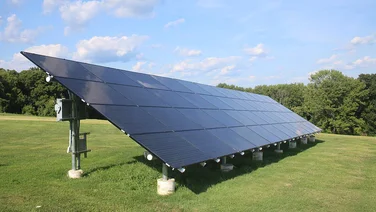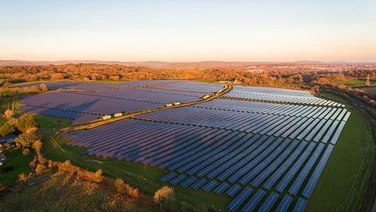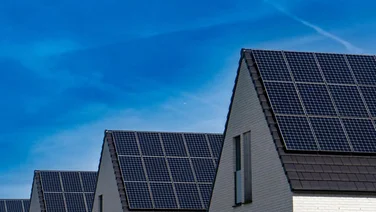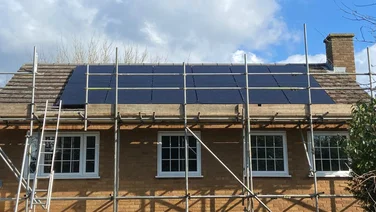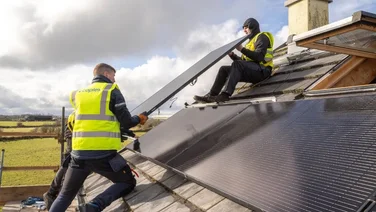- How much do solar panels cost?
- The right number of panels for your home
- Factors that impact solar panel costs
- Breakdown of installation costs
- How to reduce solar panel costs
- Solar panel maintenance costs
- How much do solar batteries cost?
- Six things to consider before buying
- Find a good solar panel installer
- Next steps
- More than 1.39 million homes in the UK have solar panels
- Solar panels not only save you money, but they can also earn you cash
- Solar panels for the average three-bedroom house will cost £7,026
- Solar panels offer savings between £270 and £640 for most homes each year
More than 1.39 million homes in the UK have solar panels, as of June 2024, according to government data.
Solar panels not only save you money, but they can also earn you cash, all while helping to reduce the planet’s carbon footprint. And they’ll still generate electricity on gloomy days, which the UK experiences a lot of. So, what are the barriers stopping homeowners from installing them?
Cost, mainly.
The good news is solar panels prices are dropping, which we’ll discuss in more detail below. There are also grants and other financing options available, so it really is more accessible than ever to install solar panels.
If you’re already clued up on solar panel costings and are ready to install, fill out our form and our trusted installers will be in touch.
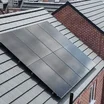
Get free solar panel quotes
Answer a few quick questions, and a trusted installer will send you a bespoke solar panel quote.
How much do solar panels cost?
The cost of solar panels is based on numerous factors, including the size of your roof, your electricity usage, whether you want to include the cost of a solar battery, and the number of solar panels you choose. Even the type of roofing, the height of your home and where your electric cables are will have an effect.
According to industry averages, solar panels for the average three-bedroom house will cost £7,026.
This is the average price of a 3.5 kilowatt-peak (kWp) system, which is typically the right fit for a standard three-bedroom house.
A household with one or two bedrooms will generally need a 2.1kWp system, which costs around £4,216 for 6 panels.
To find out how much it could cost you to install solar panels, fill in this quick easy tool.
The cost of solar panels will be different for every household, but you can gain a better understanding by viewing the video below:
To get accurate quotes from trusted installers, use our quick quotes form. All you have to do is provide a few details, and installers in your area will be in touch with quotes for you to compare.
The savings you make with solar panels will depend on these factors:
- The size of your solar panel system
- Your home’s electricity consumption
- Whether you use a significant amount of electricity during the day
- Your solar panels’ efficiency level
- Your Smart Export Guarantee (SEG) rate
Another way to potentially save once you have solar panels installed is by shopping around. You can use price comparison websites to find the best price for your home, or go to different supplier websites to find out individual prices.
What’s more, using a solar battery – which we go into more detail about below – and exporting less electricity to the grid via the SEG will result in lower SEG payments, around £63, since you’ll be using solar electricity and exporting less back to the grid.
Either way, if you install a solar battery, you’ll be paying for less electricity from the grid, as you will be using stored electricity. This will save you approximately £227 more on electricity than with solar panels alone.

Get free solar panel quotes
Answer a few quick questions, and a trusted installer will send you a bespoke solar panel quote.
When will you break even on solar panels?
It will take the average household just over 15 years (15.66 to be precise) to break even, according to our calculations.
Solar panels typically last at least another 10 years after this point. A three-bedroom household will end up with a total profit of £4,335.11 in energy bill savings and SEG revenues, on average. A one-to-two bedroom home will have a total profit of £2,601.07, while a four bedroom home will generate £6,069.16.
We base our calculations on the latest MCS data on solar panel costs, and the yearly daylight hours in the UK. Please check out our full page: Are solar panels worth it? for all the nuts and bolts.
In the meantime, use this table to determine the break even point and savings you can make for each different panel systems:
| System size | System cost | Annual savings | Break even point |
|---|---|---|---|
| 2.1 kWp | £4,216 | £272.67 | 15.46 years |
| 3.5 kWp | £7,026 | £454.45 | 15.46 years |
| 4.9 kWp | £9,837 | £636.23 | 15.46 years |
The right number of panels for your home
| Property size | Annual electricity usage | Number of solar panels | Average installation cost* | Annual electricity bill savings** | Time it takes to break even | Solar panel profit after 25 years |
|---|---|---|---|---|---|---|
| 1-2 bedroom house | 3 bedroom house | 4 bedroom house | ||||
| 1,800 kWh | 2,700 kWh | 4,100 kWh | ||||
| 6 | 10 | 14 | ||||
| £4,216 | £7,026 | £9,837 | ||||
| £272.67 | £454.45 | £636.23 | ||||
| 15.46 years | 15.46 years | 15.46 years | ||||
| £3,026 | £4,335.11 | £6,069.16 |
* Please note: These prices are based on Microgeneration Certification Scheme (MCS) cost data (March 2024), the average price of electricity (April-June 2024), and Ofgem’s latest typical domestic consumption values (2024). Total costs may increase with more complex installations. The above estimates do not include the cost of a solar battery.** Includes estimated Smart Export Guarantee payments
The Labour government’s ‘rooftop revolution’
Ed Miliband, secretary of state for energy security and net zero, plans to “unleash a solar rooftop revolution”.
In addition to approving three solar farms in the east of England, ministers are working with the building industry to make buying new homes with panels installed more accessible.
This would make it easier – and possibly cheaper – for those buying new build homes to utilise the benefits of solar energy.
It could also pave the way for solar panel installation generally to reduce in price over time, too.
The Labour government has also said it is lifting the de facto ban on onshore wind farms.
Buying and selling a home with solar panels
If you’re looking to buy a home with solar panels, this will save you a large investment on installation, but you’ll still have to consider maintenance costs.
Meanwhile, if you’re looking to sell your home and don’t have solar panels, it’s not always better to install them beforehand. Yes, solar panels can increase the value of your home, but the increase may not be as much as the installation costs.
Factors that impact solar panel costs
There are three key factors that affect the price of solar panels:
- Panel type: Some panel types, such as monocrystalline solar panels, cost more than others. This is because they use the latest technology and are highly efficient.
- Panel efficiency: The more sunlight a solar panel can convert into electricity per sq metre, the more expensive it will be.
- Panel number: More solar panels means more materials, which means a higher cost. You can limit the number of panels you need by choosing highly efficient ones (although they may cost more).
If you want to know more about solar panel efficiency, or find out how many you need, head over to our guides.

Get free solar panel quotes
Answer a few quick questions, and a trusted installer will send you a bespoke solar panel quote.
Breakdown of installation costs
The cost of your solar panel installation will ultimately come down to how much your installer charges. Each supplier will likely be different, so reach out to several to make a more informed choice.
As a guide, installers will charge different prices for:
- Parts – the materials used (solar panels, cables, inverters, etc)
- Business costs – your installer’s overheads, including scaffolding, getting approvals/planning, as well as vehicle and travel expenses
- Labour – the work of installing a solar panel system
Solar panel material costs
Typically, 40-50% of the installation costs will go towards buying the materials, including panels, brackets, and an inverter. This should come to around £3,150 for the average three-bedroom household.
The inverter converts the direct current (DC) electricity your panels produce into alternating current (AC) electricity, which can power electricity into your home.
The installation company will mark up the basic cost of these materials by around 30% to make a profit, which is standard practice in this industry and many others. Suppliers will be able to break down the costs of each material if asked, so if you have any concerns, don’t hesitate to ask.
Solar panel business costs
A further 30-40% of the price you pay goes towards your installer’s business expenses. These expenses include regulatory approvals, including planning permission, vehicles, fuel and scaffolding.
For the average 3.5kWp solar installation, business costs will come to approximately £2,450.
Solar panel labour costs
The remaining 10-30% of the cost goes towards labour – the people who will actually fit your panels and the associated kit.
This range should cover all domestic installations, including large jobs with more than 20 panels.
According to installer Everyone’s Energy, customers should be aware of installers pushing limited-time offers on solar panels. Instead, you should get quotes from at least five reputable installers and check their Trustpilot reviews before signing a contract.
How to reduce solar panel costs
Solar panel and battery installation can be pricey, but the good news is that there are government funding schemes and incentives to help reduce the cost. Here are the main ones:
- The government’s ECO4 scheme: Funding for solar panels for energy-poor households on certain benefits
- Solar Together: A group-buying scheme that can save you 30-50% on the cost of solar panels
- The Home Energy Scotland Loan: An interest-free loan for solar panels available for most Scottish residents
- Warm Homes Local Grant: This grant provides funding for low-income households with EPC ratings between a G and D. It covers various energy efficiency measures, including solar water heaters, particularly for homes off the gas grid.
- The Home Upgrade Grant (now discontinued): Before being scrapped in March 2025, this grant could help fund solar panels for low-income, off-grid households.
For more information on eligibility requirements and how to apply for these schemes, check out our guide to solar panel grants. You can get solar panels on finance from a variety of established companies, including:
- E.ON
- Scottish Power
- SolarStyle
- Sunsave
For E.ON solar panels, for example, prices for a typical six-panel (2.61kWp) solar system start at £5,785. can be bought on finance.
Its interest-free option enables you to get this installed for £241.04 per month over 24 months.
Solar panel maintenance costs
There are three future solar panel maintenance costs you should consider:
- Inverter replacement
- Maintenance and repair
- Cleaning
Solar panel inverter
The solar inverter is a key part of any solar panel system, converting electricity from DC to AC.This needs to happen before the inverter can be installed.
The cost of your inverter will be included in the final quote of your solar panel system, which will approximately be between £500-£1,000, depending on the power you choose. You should remember, however, that inverters only last around 10 years, while solar panels last 25-30, so you’ll need to factor in double the cost to get a more accurate figure.
Maintenance and repair
Solar panels are quite robust and don’t break often, but there’s always a chance they could fall prey to freak accidents, like falling trees, stray cricket balls, extreme weather, or birds developing a taste for wires.
You can prevent that last issue from happening though by bird-proofing your solar panels when you get them installed. It’s also a good idea to ask your installer what repairs or maintenance costs their warranty covers.
In the event of any other mishap, you should always hire a professional solar panel repair company. Small breakages can be fixed for £80, while sweeping repairs could cost you up to £1,500.
Cleaning
Frequent rainfall keeps the UK’s solar panels clean, for the most part, but you should clean your solar panels twice per year, if possible.
However, if you notice your solar panels becoming dirty – for example, bird droppings, or dust building up on them during a dry, hot summer – you should consider getting them cleaned.
Solar panel cleaning by a professional will cost around £100, but you can do it yourself with a hose.

Get free solar panel quotes
Answer a few quick questions, and a trusted installer will send you a bespoke solar panel quote.
How much do solar batteries cost?
A solar battery allows you to store the excess electricity your solar panels generate during the day so you can use it after the sun goes down.
With a solar battery, you’ll typically use an extra 30% of your solar energy and it will take you an extra decade to break even. The reason for this is that batteries only last around 12 years so you’ll probably need to buy two (or possibly three) over the course of your solar panels’ lifetime.
The average cost of a solar battery for a three-bedroom house is £4,500, meaning you could pay £9,000 to £13,500 over the lifespan of your solar panels.
For a 1-2 bedroom house, the cost of installing a solar battery is approximately £2,500, while for a larger house with four or more bedrooms, it’s likely to be around £8,000.
So what total price are you looking at to install a solar system with battery?
The table below explains just that. We’ve calculated the costs to install both solar panels and storage, but again, these prices will differ depending on the factors listed above.
| Property size | Annual electricity usage | Number of solar panels | Battery size | Solar-plus-storage system cost |
|---|---|---|---|---|
1-2 bedrooms | 1,800 kWh | 6 | 4 kWh | £6,716 |
3 bedrooms | 2,700 kWh | 10 | 8 kWh | £11,526 |
4+ bedrooms | 4,100 kWh | 14 | 9.5 kWh | £17,837 |
The larger the capacity of your battery, the more electricity it can store. Of course, this does come with a higher cost.
Before you decide if a solar battery is the right move for you, check out our guide to the best solar batteries. Italso goes into depth on solar battery costs, as well as what a solar battery is, how it works and if there are government grants or incentives available.
Six things to consider before buying
There are a lot of things to consider before buying solar panels. Here are six questions to ask yourself before you finalise your purchase:
- Is your roof suitable for solar panels? Make sure your roof is at the best angle and direction for solar panels. Ideally, south facing (although east or west facing is fine) and at an angle between 10 and 60 degrees.
- Do you need a structural inspection on your roof? A set of 10 solar panels typically weighs 200kg, so it’s always best to check that your roof can support the extra weight.
- What size solar panel system is right for you? Figure out how much electricity your household uses, as this will give you the best estimate for what size solar panel system meets your needs.
- Should you install a solar battery along with your solar panels? Solar batteries allow you to use more of the electricity your panels generate. This will reduce your carbon footprint and electricity bills even further, but will cost an additional £4,500 to install.
- Can you sell excess energy instead? If you want to forgo the cost of a solar battery, you can sell the energy you don’t use back to the grid with the SEG. Just make sure to set this up before your panels are installed. Most companies will insist that you have a smart meter to be able to take advantage of the SEG.
- Have you compared solar panel prices? Don’t just go with the first installer you find. Compare quotes from five reputable solar panel installers, and go with the option you feel suits you best.
Find a good solar panel installer
To find a good solar panel installer, look beyond costs and consider factors like:
- The solar panels that will be installed – see our guide to the best solar panels
- Your eligibility for government grants or funding
- Company ratings on customer review sites, like Trustpilot or Google Reviews
- The type of warranty on offer
The best solar panel installers offer 20-30-year product warranties, and at least 10-year long workmanship warranties.
For quick quotes from trusted installers in your area, simply fill in our form.
How long does a solar panel installation take?
Solar panel installation usually takes one to two days, but larger installations – over 14 panels – can take up to four days.
Much of this time is taken up with constructing the scaffolding, so don’t be concerned if it’s been a few hours and there still aren’t panels on the roof.

Get free solar panel quotes
Answer a few quick questions, and a trusted installer will send you a bespoke solar panel quote.
Next steps
Now that you have an idea of how much solar panels cost, it’s time to contact an installer.
To speed up the process, use our free custom-built tool. Just provide a few quick details about your property, and we’ll put you in touch with our expert suppliers, who will provide you with quotes to compare.


